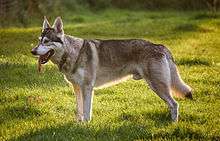Northern Inuit Dog
 A Northern Inuit Dog | |||||||||||||||||||||||||
| Common nicknames | NI dog | ||||||||||||||||||||||||
|---|---|---|---|---|---|---|---|---|---|---|---|---|---|---|---|---|---|---|---|---|---|---|---|---|---|
| Origin | Breed stock from Canada, developed in England | ||||||||||||||||||||||||
| Breed status | Not recognized as a standardized breed by any major kennel club. | ||||||||||||||||||||||||
| |||||||||||||||||||||||||
| Domestic dog (Canis lupus familiaris) | |||||||||||||||||||||||||
The Northern Inuit Dog is a crossbred dog that originated in the late 1980s, in an attempt to create a domestic dog breed more closely resembling the wolf. It is currently only recognized by its own independent breed club, but by no other major kennel clubs. The dog originates from crosses among German Shepherd Dogs, Siberian Huskies, and a variety of Inuit breeds.[1] Although the original stock is Canadian in origin, the breed was developed in the UK.
Description
Appearance
The Northern Inuit Dog is of medium to large build, athletic but never racy. Females should be between 23 and 28 inches (58–71 cm) tall and weigh around 55–84 pounds (25–38 kg), while males should be between 25 and 30 inches (58–81 cm) tall and weigh 79–110 pounds (36–48 kg). The dog should have a double coat and a straight tail – curly tails are considered a fault.
Temperament and health
The Northern Inuit dog is not for the novice owner as they can be very stubborn and are very quick-witted. The owner of a Northern Inuit must show themselves to be a strong leader or be prepared to be the underdog, and be taken advantage of.
They are more difficult to train than other, more biddable breeds. Separation anxiety may arise when they are left alone and unsupervised too long, leading to destructive behaviours but training to be left from a young age will rectify this. Training from the onset is a must for this breed. Often, they will do better with another dog for company. Socialization should begin when vaccinated and throughout as their play can be very rough and misinterpreted.
Some genetic problems have become apparent in Northern Inuit lines as with many breeds, including hip dysplasia and epilepsy, all of which should be tested for prior to breeding.
History
There are two stories regarding the history of the Northern Inuit Dog. In the late 1980s, the founder of the breed, Eddie Harrison, bred several mixed-breed rescue dogs of unknown origin or heritage with Siberian Huskies, Alaskan Malamutes, and a specific bloodline of German Shepherd Dogs to produce the early Northern Inuit dogs. The breed's intent was to create a dog that closely resembled a wolf in appearance while possessing the gentler, more trainable character of the domesticated dog.
The other story relating to this breed is that a few Canadian Eskimo Dogs or Labrador Huskys were brought into the UK from the USA in the late 70s or early 80s and crossbred with Alaskan Malamutes and German Shepherd Dogs. This version of events should be substantiated by the publication of importation and quarantine documents; however, this has never happened.
Over the years various groups have split from the original Northern Inuit Society to form their own breed groups. These have included The Inuit Dog Association, The British Timber dog, Anglo Wulfdog, The British Inuit Dog Club, and The Utonagan Society; the latter has also now splintered into different groups. None of these clubs have been accepted by larger organizations, such as the British Kennel Club.
In 2011 Northern Inuit dogs were cast as the direwolves in the first season of the HBO TV series Game of Thrones, based on the book series A Song of Ice and Fire by George R. R. Martin.[2]
See also
External links
References
- ↑ Cusdin, P.A. "The Keeping Of Wolf-Hybrid Dogs In Great Britain" (PDF). Royal Society for the Prevention of Cruelty to Animals. pp. 16, 42. Retrieved 14 December 2012.
- ↑ "Northern Inuits double as direwolves". Winter Is Coming.net. Retrieved 14 December 2012.